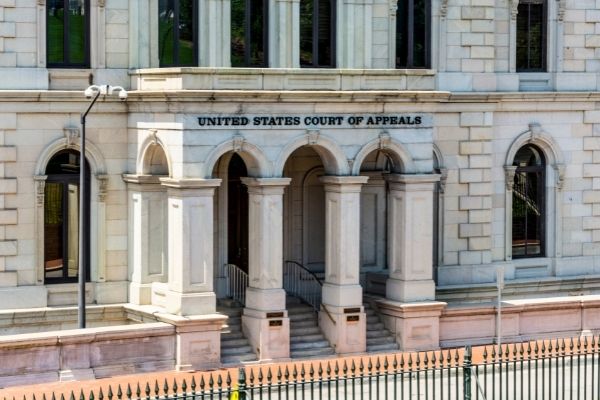Ideal Federal Appeal Lawyers: Achieving Justice in Federal Appeals
Ideal Federal Appeal Lawyers: Achieving Justice in Federal Appeals
Blog Article
Demystifying the Process of Federal Appeals: What You Need to Know
Navigating the intricate world of federal appeals can usually feel like traversing undiscovered waters for those strange with the procedure. Recognizing the nuances of appellate court jurisdiction, the intricacies of filing a notice of charm, providing an engaging quick, and making an influential dental debate are vital components that can considerably impact the outcome of an instance. By unraveling the layers of complexity surrounding government allures, people can obtain a more clear understanding right into the systems that regulate this critical point of the lawful system.
Comprehending Federal Appeals Refine
Exploring the elaborate realm of the government allures procedure reveals a systematic and organized trip with the judicial system. Federal appeals work as an essential mechanism for reviewing choices made by lower courts. Understanding this procedure is crucial for any individual associated with legal proceedings at the government degree.
The procedure usually begins with an event disappointed with a lower court's judgment submitting a notice of allure. This activates an evaluation by a higher court, where a panel of courts evaluates the lawful debates provided by both events. Briefs detailing the legal thinking behind each party's placement are submitted, and oral disagreements may be heard to make clear complicated concerns.
The appellate court's choice is based on a complete examination of the lower court's process and the arguments offered. As soon as the appellate court reaches a choice, it can attest, turn around, remand, or customize the lower court's judgment, giving clearness and finality to the legal dispute.
Appellate Court Territory Described
Appellate court jurisdiction refers to the extent of situations that a certain appellate court has the power to examine and decide upon. Unlike test courts that hear instances for the initial time, appellate courts are limited to examining choices made by lower courts.
Appellate courts have jurisdiction over specific kinds of situations, generally those entailing legal mistakes, step-by-step problems, or inquiries of law as opposed to factual disagreements. The jurisdiction of appellate courts is usually described in laws and regulations that govern the court system. Comprehending appellate court territory is important for events involved in the appeals process as it establishes whether a case is eligible for evaluation and the level to which the appellate court can interfere in the lower court's decision.
Declaring a Notification of Allure
The initial step in starting the federal appeals process includes submitting a Notification of Allure with the appropriate appellate court. This vital record officially notifies the court and the other parties associated with the situation that the appealing celebration intends to seek a testimonial of the reduced court's choice. Submitting a Notification of Charm is a stringent step-by-step requirement that establishes the appellate procedure moving.
When preparing the Notice of Charm, it is necessary to guarantee conformity with the certain policies and guidelines of the pertinent appellate court. federal crime attorney. The paper has to usually include information such as the instance name, the lower court's name, the day of the judgment being appealed, and a concise declaration suggesting the premises for the charm

Briefing and Oral Argument
In the appellate procedure, offering written briefs and participating in oral arguments play essential roles in promoting for the appealing event's position prior to the appellate court. Briefs are comprehensive lawful documents that lay out the celebrations' arguments, lawful authorities, and evaluation supporting their settings. These created submissions supply the court with a detailed understanding of the truths of the instance, the relevant legislation, and why the appealing event thinks the lower court's decision must be overturned.
Complying with the entry and testimonial of the briefs, oral arguments use the events an opportunity to further clarify their settings, resolve any kind of questions the appellate judges may have, and highlight bottom lines from their composed briefs. Dental debates are an opportunity for the lawyers to persuade the judges through verbal advocacy and actions to queries from the bench.
Both the created briefs and dental debates are crucial components of the appellate process, permitting parties to present their case thoroughly and compellingly before the appellate court. - federal crime attorney
Obtaining the Appellate Court Choice
The appellate court's choice is commonly provided in a written layout and details the court's verdicts on the lawful problems presented, the reasoning behind their choice, and the judgment rendered. The time framework for getting the appellate court's choice can vary, however courts aim to offer prompt resolutions. Whether the appellate court affirms, turns around, or remands the reduced court's choice, recognizing the ramifications of the ruling is essential for all events involved in the appellate process.
Conclusion
In verdict, the government charms process is a complicated however important step in seeking justice. Understanding the appellate court territory, submitting a notice of allure, preparing briefs, and providing dental debates are all important elements of this procedure. Inevitably, obtaining the appellate court decision can provide clearness and resolution to legal conflicts. It is vital to navigate the federal appeals procedure great post to read with persistance and interest to information to attain a reasonable end result.
As we proceed from recognizing the government allures procedure to exploring the ins and outs of appellate court jurisdiction, a fundamental aspect comes to light regarding the authority and limits of these greater courts in the lawful landscape. Appellate court territory refers to the range of cases that a particular appellate court has the power to review and decide upon. Unlike test courts that hear cases for the initial time, appellate courts are restricted to evaluating choices made by lower courts. Understanding appellate court jurisdiction is critical for events included in the appeals procedure as it figures out whether a situation is eligible for testimonial and the degree to which the appellate court can intervene in the reduced court's decision.

Report this page